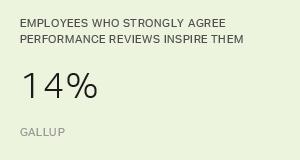Story Highlights
- Developing compatibility is harder to do than discovering it
- Productive question: "How could we be compatible?"
- Compatibility isn't achieved instantly -- it's a journey
Strengths coaching is an approach that intentionally focuses on a person's natural ability. My first goal as a strengths coach is to help people capitalize on their natural abilities, or those ways of thinking, feeling and behaving they can productively apply with the most ease and enjoyment.
In addition, I work with people to help them understand and manage their vulnerability, or the situations and places where this natural ability can be misunderstood or unproductively applied. The people I coach will also need some help in understanding and owning their liabilities or disabilities, or those ways of thinking, feeling or behaving that don't come with ease or enjoyment.
Finally, I find that strengths coaching must eventually focus on compatibility, or how a person's abilities coexist with or are used to cooperate with the abilities of others. Compatibility is crucial in professional and personal success. It's at the core of great business partnerships and great teams -- and, for that matter, great marriages and great families. As a result, the people I coach are often very interested in finding a magic formula for compatibility.
Mistaken Assumptions About Compatibility
Most of us think we will experience compatibility when we can find and choose the perfect partner or teammate. I wonder if this is why businesspeople who use the Clifton StrengthsFinder assessment (CSF) for development are often tempted to use the CSF as a selection instrument. I can almost hear them thinking, "If I can just avoid the person who has incompatible themes and find the person who has compatible themes, everything will be perfect. If I can just find the magic CSF formula, we will all live happily ever after."
Embedded in this thinking are two mistaken assumptions. The first is that compatibility is something that's primarily discovered rather than created; the second is that because compatibility by definition is "existing or performing in harmonious, agreeable or congenial combination with another or others," it's most likely to occur when differences are limited and tension is eliminated.
My theory is that we gravitate toward the first assumption because discovering compatibility seems much easier than working to develop it. If compatibility has a magic formula, I just need to ask people to take an assessment and then apply the magic formula. Finding the perfect partner or mate seems an easier option than figuring out how to be the perfect partner or mate.
I'm not suggesting that making wise selection decisions is unimportant. There are rare times in life when we do get to choose a colleague, spouse, friend or roommate. But much of our life is spent working and living with people we didn't choose. For example, we don't have the luxury of delaying collaboration until we find the perfect coworker. Instead, most of us need to quickly figure out, "How can I best work with this person?" or "with these people?"
Many people, when asked to work with someone new for the first time, will ask the question, "Are we compatible?" There will be times where that question is relevant. But, in most cases, a better and more productive question is, "How could we become compatible?" or, "How could we work or live together in a more harmonious, agreeable and congenial manner?"
Don't Assume Some StrengthsFinder Themes Are Incompatible
A third flawed assumption about compatibility is that some CSF themes are mutually exclusive: like water and fire, they just don't mix. Granted, some themes are less likely to occur together as dominant themes within a person. For example, Command and Harmony aren't likely to occur together as dominant themes, nor are Maximizer and Restorative.
Just because two themes aren't likely to occur together within a person, however, it's wrong and unproductive to assume that these same two themes are incompatible and antagonistic when they occur in two different people. Instead of assuming that Command and Harmony are incompatible themes, for example, it would be much more beneficial to help people with these themes think about how they could work together in a more harmonious, agreeable or congenial way. How can one person's theme positively enhance another person's themes in a way that allows both themes to be used authentically at the same time?
Let's go back to the example of fire and water. Though water can extinguish fire and fire can evaporate water, there are situations where they can work together productively. Water can help manage or control a fire and keep it from becoming a wildfire, for example. In the same way, when a specific amount of heat or fire is applied to water, water's temperature will increase, and it might become more useful if it's warm or boiling.
Sometimes we're lucky and stumble across a perfectly compatible colleague and partner. But it's more likely that developing compatibility is a long process that takes hard work and awareness. The first step toward creating compatibility is to change the conversation. Ask yourself: How can I be a great partner to others? What skills or talents can I offer that another person may need? What can I contribute to a compatible partnership? What can we achieve that's greater together?

